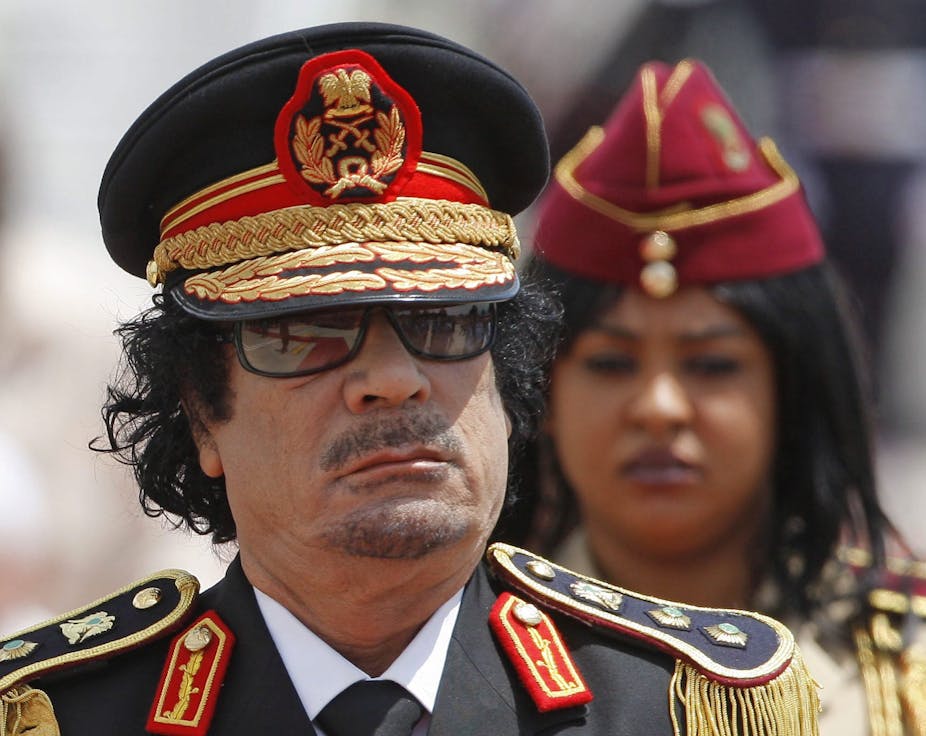The death of Colonel Muammar Gaddafi in Sirte highlights the remarkable impact a single individual can have on a whole country. Until he was captured or killed Libyans could not get on with the job of rebuilding.
His mere existence represented an inspiration to his followers and a continuing threat to the new order. Gaddafi’s death will, therefore, clear the way for the provisional government to get on with its job.
Gaddafi’s supporters
But big problems remain. Gaddafi’s son, Saif Al Islam, has reportedly escaped from Sirte.
Saif lacks his father’s hold over Libyans but he is a formidable character who might be able to rally remnants of his father’s regime and continue the fight.
And, as we have seen over past weeks, Gaddafi still has many committed supporters.
How they respond to his death and the nature of his killing may determine whether the country can settle down to the reconstruction process or has to suffer further violence.
Gaddafi’s death raises the question of how to restore domestic harmony between supporters of his regime and its opponents.
While many people inside and outside Libya have expressed satisfaction that he is dead, others could have done with the reassurance that might have been provided by Gaddafi’s trial, either in Libya or in the International Criminal Court as mandated by the UN Security Council.
Regional implications

Gaddafi’s death has regional implications.
The Colonel’s inability to influence his fellow Arab leaders led him to change his focus to Africa, where he made significant financial contributions to various regimes, including Zimbabwe.
While the Arab world largely turned against Gaddafi, sub-Saharan Africa continued to support him to the end.
As part of his pact with Africa, his forces were supplemented by African mercenaries and the hatred that they built up has been expressed in some of the less savoury excesses of the revolutionary forces.
The new Libya is, therefore, likely to reorient itself to the Arab world and Libyans will be watching events there closely, just as their neighbours will be watching them.
Three dictators have gone, two are under great domestic pressure and the regimes in Saudi Arabia and Bahrain are displaying great nervousness about the movement for change.
The ones to watch
Among Libya’s neighbours, Algeria will bear watching closely.
The military-dominated regime there was hostile to the Libyan revolts and provided safe haven to members of Gaddafi’s family, much to the irritation of the transitional government.
Algeria responded to the wave of unrest across the region with cosmetic changes, but the country remains frozen by the memory of the horrific civil war that plagued it in the 1990s. The regime has reluctantly come to terms with Gaddafi’s fall but will be eager to prevent the contagion of change from spilling over their mutual border.
Electoral tests
Libyans will be watching Tunisia with greater hope. Tunisians vote in a general election on Sunday. It’s only a small country and its influence across the region is limited. Nevertheless, an electoral outcome that promotes the democratic drive will strengthen democratic forces in Libya.
The big one will be Egypt. Parliamentary elections are scheduled there for 21 November and their outcome will have repercussions across the Middle East.
Successful elections, which reflect the will of the people, will provide huge inspiration to people in other countries struggling to throw off the dead hand of dictatorial rule.
Elections that are manipulated to promote the interests of the provisional military council will set back - but not necessarily reverse - gains made elsewhere.
The revolutions that have swept the region have displayed considerable common features, but this should not obscure the marked differences between the countries of the region.
While Egypt’s military is in a position to direct the course of the protest movement there, the same does not apply in Tunisia and Libya where the armed forces are not so powerful.
Moderating rivalries
Libya’s armed forces were kept weak by Gaddafi to prevent military leaders from organising a coup against him. The Libyan revolts featured military figures but much of the fighting was done by civilians who can be expected to go back to their jobs as soon as possible.
The challenge facing the transitional government will be to establish the conditions under which tribal rivalries can be moderated, reconciliation can be pushed forward and economic revival can be pursued. Gaddafi’s removal is only a small step along that path.

